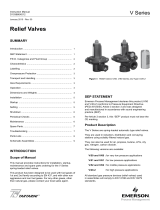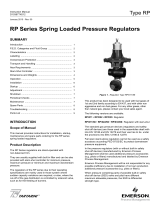
2
299H Series
To avoid such injury or damage,
provide pressure-relieving or pressure-
limiting devices (as required by
the appropriate code, regulation,
or standard) to prevent service
conditions from exceeding limits.
Additionally, physical damage to the
regulator could result in personal
injury and property damage due to
escaping uid. To avoid such injury
and damage, install the regulator in a
safe location.
Clean out all pipelines before installation of the
regulator and check to be sure the regulator has
not been damaged or has collected foreign material
during shipping. For NPT bodies, apply pipe
compound to the external pipe threads. For anged
bodies, use suitable line gaskets and approved
piping and bolting practices. Install the regulator
in any position desired, unless otherwise specied,
but be sure ow through the body is in the direction
indicated by the arrow on the body.
Note
It is important that the regulator be
installed so that the vent hole in the
spring case is unobstructed at all times.
For outdoor installations, the regulator
should be located away from vehicular
trafc and positioned so that water, ice,
and other foreign materials cannot enter
the spring case through the vent. Avoid
placing the regulator beneath eaves or
downspouts, and be sure it is above the
probable snow level.
Type VSX-2 Installation
Warning
If the Type VSX-2 is exposed to an
overpressure condition, it should be
inspected for any damage that may
have occurred. Operation below these
limits does not preclude the possibility
of damage from external sources or
from debris in the pipeline.
The Type VSX-2 may be shipped separately from
the regulator. To install the unit on a regulator, place
the new O-rings (keys 2 and 3, Figure 1) on the
Type VSX-2 and slide the module into the regulator
body. Secure the Type VSX-2 to the regulator body
with the four set screws (key 4). The unit may be
oriented in any direction with respect to the sensor
line connection.
Overpressure Protection
The recommended pressure limitations are
stamped on the regulator nameplate. Some type
of overpressure protection is needed if the actual
inlet pressure exceeds the maximum operating
outlet pressure rating. Overpressure protection
should also be provided if the regulator inlet
pressure is greater than the safe working pressure
of the downstream equipment.
Regulator operation below the maximum pressure
limitations does not preclude the possibility of
damage from external sources or debris in the
line. The regulator should be inspected for
damage after any overpressure condition.
Startup
The regulator is factory set at approximately the
midpoint of the spring range or at the pressure
requested, so an initial adjustment may be required
to give the desired results. With proper installation
completed and relief valves properly adjusted, slowly
open the upstream and downstream shutoff valves.
Adjustment
To change the outlet pressure, remove the closing
cap or loosen the locknut and turn the adjusting
screw clockwise to increase outlet pressure or
counterclockwise to decrease pressure. Monitor
the outlet pressure with a test gauge during the
adjustment. Replace the closing cap or tighten the
locknut to maintain the desired setting.
Type VSX-2 Trip Adjustment
Note
An adjustment tool is included with
the Type VSX-2. Use only this tool
to make adjustments to the unit. To
make adjustments, the overpressure
trip spring is found under the
outer adjusting screw and the
underpressure trip spring is found
under the inner adjusting screw.
To adjust the Overpressure Trip Spring:
1. Adjust the overpressure trip setting to its
maximum compression.
2. If present, adjust the underpressure spring to its
minimum compression.
3. Backpressure the unit with the desired
overpressure trip pressure.
4. Reduce the overpressure trip spring
compression until the Type VSX-2 trips.













